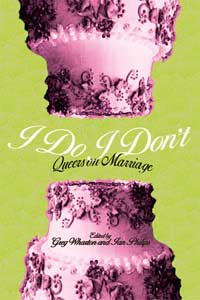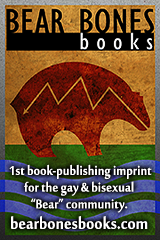| Moving the Mountain by Ron Suresha an excerpt and long addendum to the essay appearing in I Do/I Don’t: Queers on Marriage |
||||
|
The March 15, 2004 cover illustration for The New Yorker, “Dress Reversal” by Mark Ulriksen, depicts two attractive betrotheds trying on identical wedding gowns in adjoining mirrors. On the right stands a young female, the traditional blushing bride. On the left, a definitely bearish male, sporting a trim van Dyke and curly, chestnut-brown chest hair, gazes at his own seductive image in the mirror. The woman is astonished not at her own gorgeous reflection – but at that of the other, hirsute, bride-to-be. I can imagine myself as that goateed, hairy-chested bridegroom in lace. I can construct myself as wearing a wedding gown because genderfuck is a typically queer expression of my homomachobearish psyche. Whether I look better in a gown or a tux – or in a silver lame jumpsuit, for that matter – is someone else’s entirely subjective opinion. But this vision of myself as bride/groom doesn’t reflect some unconscious desire to buy into an essentially classist, sexist, capitalistic 1970s American dream of domestic bliss. Two or more same-gender folks getting hitched just seems more subversive than conformist, even if by having weddings many of these couples are blindsided by the wedding industry into buying into some exurban Barbie-doll bliss. Until recently, I too would rather have said, “I don’t” than “I do.” Several life-changing events unfolding over the past three years, however, have forced me to reconsider my singleness. Eventually, I surrendered my precious solitude by praying to find a worthy partner. My desire eventually took form in silent supplications to my Indian-born spiritual teacher and to the divine power, Shakti. I figured I’d go right to the top with this request, because I am an unusually particular and peculiar fellow. For me, the problem was not settling down so much as settling on a suitable candidate for a lifetime spiritual companion. . . . [Find out the amazing conclusion to Ron’s story in I Do/I Don’t.]
[The following is the continuation of the article submitted but not included in the book:] I attended the Massachusetts May 17th ceremonies in Provincetown, the first town statewide to assert its intention to accept applications for marriage from nonresident same-sex couples. I wanted to hear stories from those brave lovers, not only because I sought interviews for journalistic projects, but also because I wanted to experience their conviction that marriage was right for them. Dozens of couples came to town hall on that temperate day, from across the Bay State and as far away as Florida, to assert their essential human right to love whom they choose. Say what you want about the patriarchal and oppressive nature of civil marriage. No gay marriage that I saw appeared to be merely a commercialized imitation of straight marriage. These people were there to love, to be loved, and to have their love and commitment recognized by all. Among the dozens of Bay State couples wed the historic morning of Monday, May 17th, I located no bisexual-identified partners – though many had been married before, some with children and grandkids. It seemed inappropriate to yell above the crowd, “Are there any bisexuals here getting married?” None of the dozen or more individuals I did ask identified as bi. However, I interviewed two handsome husbears – Chuck Walker and his partner of two years, Mike Reed, from Woods Hole, Mass. The woofy couple emerged radiantly from town hall, wearing complementary fur-revealing open-neck shirts, handsewn by Chuck, holding their license papers. “I’ve got goosebumps,” Chuck said, and indeed we could see the excited flesh on his hairy arms. As a couple living together, Mike and Chuck exemplify the need for same-sex civil marriage. A self-employed builder, Mike can now gain access to less expensive healthcare through Chuck’s workplace insurance. An example of the difference in cost to their household, they explained, was their costs for the pre-nup bloodwork: $5 for Chuck, but for Mike, more than $100. Mike expressed fear that “the powers-that-be will strip us of our rights” one way or another, before their dream of marriage would be consummated. Earlier, state troopers in bright orange jackets and local police walked prominently through the gathering crowd, but their stolid presence felt assuring rather than threatening. But for now, among the scattering of couples in front of Town Hall receiving blessings from dozens of cheering well-wishers, chatting with the international and local media, both Chuck and Mike felt safe that their dreams to be married will be realized. They were prepared to wait the three days until Thursday, May 20th, when relatives arrived in Provincetown for a simple ceremony with a local Justice presiding. Their immediate plans were to “get breakfast, explore the town,” and, upon return to Woods Hole, simply dig into “some home reno” on the house. The legal union of Mike and Chuck threatens no one who is not on the defensive. The logic of blaming same-gender couples for the collapse of marriage escapes me. Why not blame it on Britney? Why are rightwing spokepersons mum about her morally bankrupt 48-hour photo-op marriages? Sure, she’s an easy target, but flaunting her superstar heterosexual privilege still models immoral behavior to children. Ironically, religious and societal hypocrisy has sunk pavestones in the road to civil rights for gays, lesbians, bi, trans, and queer folk. Who can blame us for walking that path the first chance we get? Many heterosexuals apparently think that the decline of marriage is about everything but their own acts of explicit gender violence, the shadow side of complicit repression of sexual and gender variance. Will gay marriage prove itself yet another amazing queer sociocultural innovation? Certainly it is a large-scale revaluing, a reinvestment of millions of American citizens’ commitment to others’ welfare that inspires – and yes, threatens the old social institution in a far-reaching arc toward a twenty-first-century society. Right now, the U.S. Senate is hearing arguments on gay marriage. They must be made to hear the pleas of thousands of queer families formed from love and respect who are, no matter how blackly evil and depraved anyone tries to paint us. To choose whom you want to love, and who you want to love you, is an essential human right. Gay marriage may indeed alone have the power to save the traditional institution of marriage from moral failure. Not that the old social order will crumple tomorrow, of course – but this is certainly a step in the right direction. My local Providence Pride celebration exhibited some emphasis on gay marriage, but this felt like the same family event it has been. Sexy young buff dykes, over-the-top drag queens, leatherman Jeff selling SM/leather flags and rainbow cat stickers, HIV/AIDS/sex info and counseling, realtors and banks, the amazing abundance of flesh of all shades and ages. The open sexuality of Pride easily coexisted with the kids’ area and the lesbian couples with babies on the lawn listening to lesbian folksingers onstage. It all worked. It was a quiet but astonishing paradigm shift, display of diversity, with room in the open air for all. At that moment, it seemed, gay marriage wasn’t the point. It hadn’t suddenly made us all one gay tribe again. Gay marriage is the inevitable fruit of the immense power of gay/queer love, not its cause. But the result has unified millions of people to move society toward an expanded pluralistic world that affirms our innate human right and duty to love. The magic of the moment, just wandering in the Providential sunshine among the crowd, thinking of my thirty-plus years of gay life, the thirty ahead with Rocco, and that I have lived to share that sublime moment in the Providential sunshine. Let us revel in the bounty that legal marriage available to all can become. Let us show others how to create an exuberant society whose citizens are sexually integrated, physically diverse, and spiritually fulfilled. Beyond all expectation, we shall succeed. |
||||
|
||||
author, activist, and anthologist of books centering on gay and bisexual male subcultures



